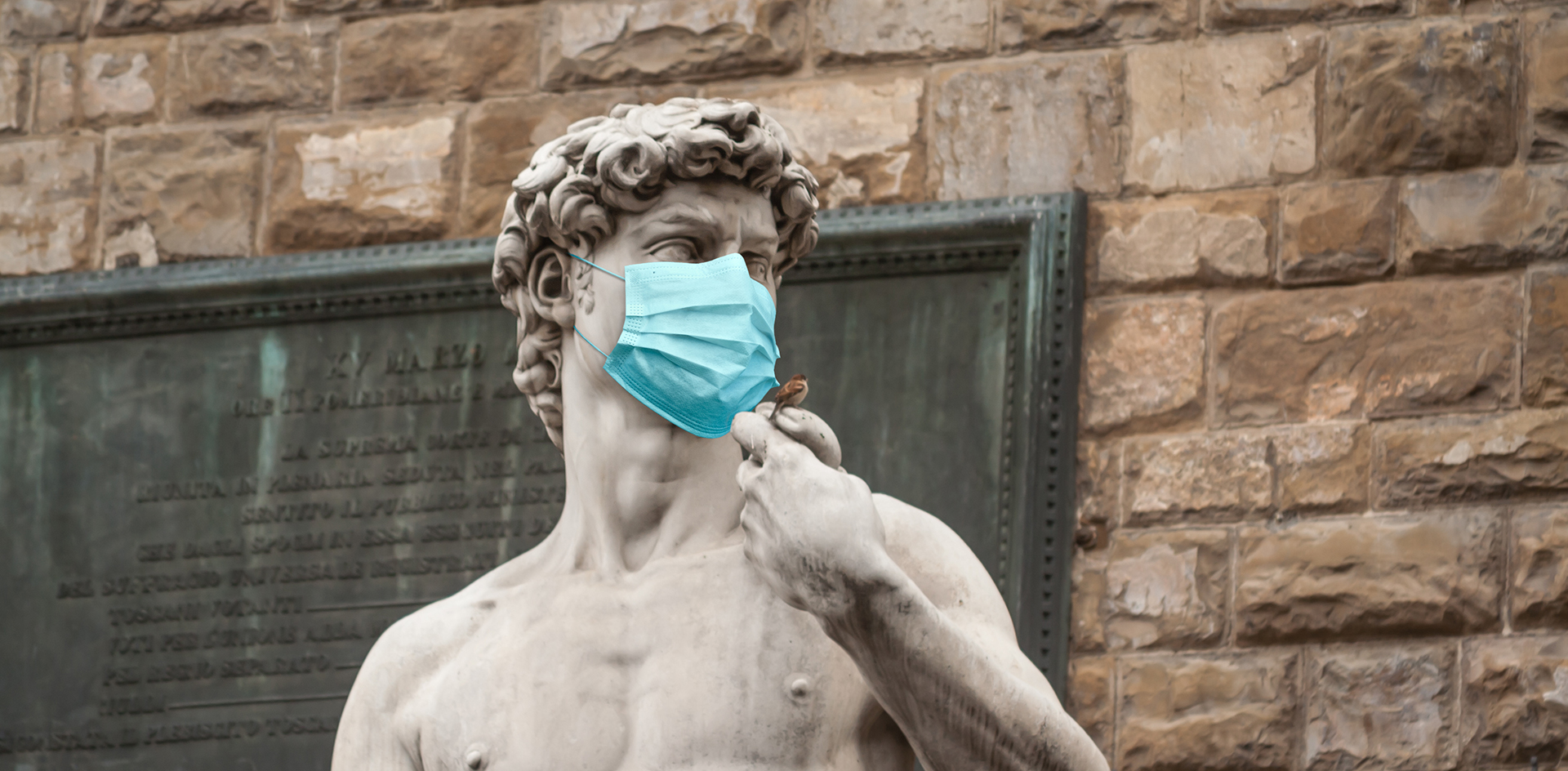During the COVID-19 pandemic, conspiracy theories caused protests and violent attacks in Italy. This is not exactly a new phenomenon. Conspiracy theories have always existed. While some can be harmless, others can be extremely dangerous. During the pandemic, the dissemination of dangerous conspiracies increased dramatically. Radical right extremists all over the globe filled social media platforms with theories on the virus’s origins, who is to blame for it, and how governments are controlling populations by imposing lockdowns and subsequently through mask and vaccine mandates. In Italy, these theories caused much damage.
The effects of conspiracy theories in Italy were particularly noticeable when a wave of protests spread across various moderate to large cities last year. A small portion of the Italian population protested all over the country against the government’s mandatory vaccinations and use of the Green Pass, a document needed until April 1, 2022 to enter public places and given only to those who had been given both vaccine doses. The conspiracies fuelling these protests focused on the government’s handling of the pandemic, the dangers of vaccines, and the basic existence of COVID-19. While most protests were peaceful, conspiratorial belief pushed some individuals to carry out violent attacks.
Conspiracy Theories and COVID-19
Conspiracy theories can be understood as “attempts to explain the ultimate causes of significant social and political events… with claims of secret plots by… powerful actors.” Scholars find that they tend to arise in correspondence to incomprehensible and unexpected worldwide events that cause feelings of fear, uncertainty, lack of control, and stress. Individuals who possess these feelings tend to believe in conspiracies because they provide alternative and simplistic answers to events which would otherwise be difficult to understand.
The COVID-19 pandemic has created the perfect environment for conspiracy theories to flourish. Given its uncertain and inexplicable environment, people have turned to conspiracies to better understand the situation they are living in. In addition, thanks to the stay-at-home orders, people have spent the majority of their time on social media platforms, which are rife with conspiracy theories.
Myriads of radical right extremists were and continue to be extremely active on social media platforms. They spread numerous conspiracies regarding the origins of COVID-19. While some were new in nature, others were readapted old tropes which came to include the pandemic. Some of the most common conspiracies disseminated by the radical right were: anti-Asian (with many different scenarios speculating as to whether poor food hygiene was to blame or whether Asian governments intentionally created and spread the virus to secure global dominance), anti-Semitic (the Jewish population was blamed for spreading the virus to advance its financial goals), anti-immigrant (with a readaptation of the Great Replacement theory, itself often imbued with implicit anti-Semitism, in addition to anti-black and Islamophobic elements), anti-government (governments were blamed for controlling and suppressing societies by taking away individual freedoms) and anti-vaccine (governments were criticised for using them to monitor people).
Conspiracy Theories in Italy: Dangerous or Not?
Last year and early this year, Italy experienced a wave of nationwide protests, with individuals expressing their anger towards restrictions imposed by the government. The government imposed vaccinations for workers in almost every sector. Workers who refused to be vaccinated were to have their employment terminated. The Green Pass was mandatory too. Italians utilized their right to protest to express their anger against these policies. Sadly, this anger is often fuelled by nefarious, conspiratoracies. Some of these clearly encourage individuals to carry out violence during or after the protests.
Between September 2020 and April 2021, during the first wave of nationwide protests , Italian citizens manifested their anger against the government’s mandatory lockdowns, they questioned the existence of the virus, and doubted the COVID-19 vaccine. Their anger was reinforced by a series of conspiracy theories that had spread on social media. Most of these conspiracies stated that COVID-19 did not really exist, but was actually a falsehood perpetrated by governments to control individuals. They claimed that the Italian media was exaggerating the number of deaths and cases in the country. They also argued that governments had created vaccines to monitor individuals. Furthermore, these vaccines were believed to be dangerous as they were created far too quickly and without enough tests to prove their efficacy.
This more recent wave of protests was also founded on conspiracies ranging from anti-government to anti-vaccine. A portion of the Italian population is convinced that the government is consolidating its power over its citizens by controlling them, taking away their individual rights and freedoms, and controlling the country’s money supply. They also believe that vaccines are still harmful and should not be administered to young children. Protestors have come to define the Italian government as a “health dictatorship or tyranny.” In November 2021, a massive crowd in Milan greeted the well-known vaccine skeptic Robert Kennedy Jr, praising his words against the Green Pass and mandatory vaccination.
Unfortunately, as mentioned earlier, not all protests were peaceful. Some resulted in violent attacks. On April 3. 2021, Nicola Zanardelli and Paolo Pluda attacked a vaccination hub in Brescia, Lombardy with multiple incendiary devices. Investigators and prosecutors argued that the main aim of the perpetrators was to damage the hub and interrupt the vaccination campaign in the city.
The attack was a direct outcome of Pluda’s journey into conspiracy theories. On his Facebook page, Pluda shared a variety of posts, pictures and memes of different conspiracies ranging from anti-government to anti-immigration, from anti-vaccination to anti-COVID. He believed that COVID-19 was a hoax and that the government had created it for its own agenda and that vaccines were created to control the population. Because of his beliefs, Pluda took part in many of the anti-vaccination and anti-COVID protests, which he advertised on his Facebook page with the aim of gathering as many of his friends and followers as possible.
Other protests aimed at taking down the government and changing the social and political order. These protests turned violent when on October 9, 2021, protestors guided by the leaders of Italy’s far-right groups, such as Forza Nuova, broke into the headquarters of the Italian General Confederation of Labor (CGIL — Italy’s most important trade union) in Rome and caused havoc. Protestors managed to overtake police officers at the entrance and gradually make their way through the offices, damaging furniture, destroying objects and breaking windows.
How to Curb Violence?
After the violent attack in Rome, Italian prosecutors and investigators have been working to arrest any individual with extreme and radical views who was tied to the protests. Many of the individuals arrested were part of a Telegram channel called “Basta Dittatura” (“Stop the Dictatorship”), which has been taken down because of its hateful comments. The channel boasted several thousand members that talked about taking up arms, committing attacks on Italian institutions and taking down the health dictatorship.
While this is a step in the right direction, the Italian government can implement more information campaigns — both online and offline — which could be crucial to avoid the spread of conspiracies. By increasing the amount of factually correct information on vaccines and COVID-19 and by taking down posts, videos, and memes that spread conspiracies, the Italian government could mitigate violent attacks in the future.
Conspiracy theories can be dangerous and can push individuals to commit violence, especially when the environment is stressful, inexplicable, and uncertain. The conspiracies related to the COVID-19 pandemic have pushed individuals worldwide to commit violent attacks. Italy is no exception and, like other nations, must act speedily to curb such violence.
The views expressed in this article are the author’s own and do not necessarily reflect Fair Observer’s editorial policy.
Will you support FO’s journalism?
We rely on your support for our independence, diversity and quality.
Support Fair Observer
We rely on your support for our independence, diversity and quality.
For more than 10 years, Fair Observer has been free, fair and independent. No billionaire owns us, no advertisers control us. We are a reader-supported nonprofit. Unlike many other publications, we keep our content free for readers regardless of where they live or whether they can afford to pay. We have no paywalls and no ads.
In the post-truth era of fake news, echo chambers and filter bubbles, we publish a plurality of perspectives from around the world. Anyone can publish with us, but everyone goes through a rigorous editorial process. So, you get fact-checked, well-reasoned content instead of noise.
We publish 2,500+ voices from 90+ countries. We also conduct education and training programs
on subjects ranging from digital media and journalism to writing and critical thinking. This
doesn’t come cheap. Servers, editors, trainers and web developers cost
money.
Please consider supporting us on a regular basis as a recurring donor or a
sustaining member.
Will you support FO’s journalism?
We rely on your support for our independence, diversity and quality.







Comment